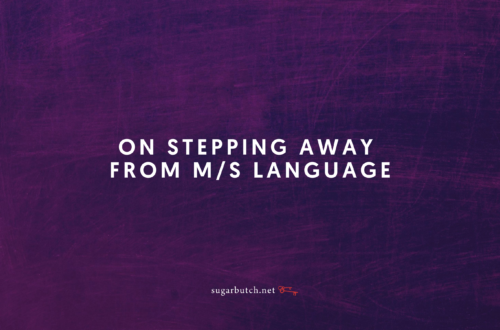I’m a FAAB genderqueer pansexual in a long-term monogamous relationship with a straight cissexual guy. I adore him, he accepts who I am and we have a wonderfully fulfilling and communicative relationship overall, but I occasionally feel strange and almost guilty that I’m in a relationship that masks my queer identity, one where I can “pass” as a straight girl.
That was setup. My question is, how can I best nurture and feel fulfilled and at peace with my queer identity within the context of my relationship with my straight, cissexual sweetie?
Cultivate and celebrate your queerness and queer identity in contexts other than your monogamous relationship, since that is not visibly queer. Become involved in other ways, with a queer book group or queer activism or queer arts or whatever particular flavor of queer culture strikes your fancy. Make friends with other folks who have this difficulty so you can compare notes and identify with each other.
I bet there’s a Fetlife group or two out there for folks in this position.
The guilt and the “passing” is an indication that you’ve got a little bit of privilege, even if you don’t want it. It’s not real privilege, but it is perceived and therefore given to you. This culture will validate your relationship and see you as a certain kind of person in the context of your partner—call it a sort of orientation attribution, the orientation that others attribute to you, even if that’s not how you identify.
So the trick is a reconciliation of the orientation attribution that others perceive and your true orientation, which are different.
There are two big pieces to it, I think: internal and external. Externally, in order to have some peace with this, you’ll need to accept that you will get critique and criticism from queers, who constantly police identity (sad but true). It’s not that you are wrong, though; it’s that they are going along with some very superficial understandings about how queer identity works. And being that you are trying to broaden and radicalize this queer identity label (as being more than just who you sleep with), you will probably be in the position of being attacked for that, for a long time. I think in order to make peace you’ve got to radically accept that, decide how you’re going to react when folks do this, and then let it go. If it really bugs you and gets under your skin every time it happens, you won’t get to a place of peace about it.
Internally, aim to cultivate a place in yourself that deeply knows how queer you are such that their critique won’t knock you off center when it comes, which, sadly, it inevitably will. Practice a couple quick and easy responses when someone criticizes your identity or claims that you aren’t “queer enough” for one thing or another—to be in this queer space, to be consuming queer culture, whatever. If you can stand firm in your response—that they are the ones with a mistake, not you—they’ll look silly. But when you waver and let their attacks bother you, you will appear as if they have a reason to critique and question your queerness.
Internally, ultimately, you’ve got to deeply know that it is their problem, not yours. There is more to a queer identity than just who you’re sleeping with, and while many people don’t understand that, many others do, and you’ve got to understand that deeply in order for others to take what you’re saying seriously.
This is part of being in a (perceived) privileged position: the constant correcting of those around you, and the constant use of passing as a tool for change and deeper understanding. And there are ways to use passing as a tool, despite that it is also incredibly frustrating and invisibilizing.
The bottom line, I think, is that you’ve got to build some Radical Acceptance around your identity: to deeply accept that you are in a radical position, that you are pushing the edges of what it means to be queer, and that most people probably don’t and won’t understand that, so you’re going to get attacked and critiqued because of it. So cultivate your queer identity in areas other than your relationship, since no matter how queer the sex between you or gender roles within that relationship, you’ll probably have an orientation attribution of straight. Cultivate all the dozens of other areas of your life that are and can be perceived as queer, and build those up strong and solid. Work on your own sensitivity around your queer identity, too, so you can feel strong in it.




Hi. This has nothing to do with this particular post, but i just wanted to say i’ve been reading your blog now and then for a while and i really enjoy it. Although i can’t say i understand and realate to everything, the way you write makes me want to read more about it. So keep up the great work! You’re awesome!
I second all of this. My lover and I are both queer, but we ‘pass’ as a (albeit odd-looking) heterosexual couple. This causes us a lot of the discomfort that you have described, and the main way that we combat it is to reaffirm each other’s queerness. It sounds trite, but sometimes it helps to remind myself that I _am_ queer, and just because someone else can’t see it, it isn’t any less valid. On the other hand, being seen is one of the weird double-bind necessities of being/appearing queer. So I do understand your distress. But I think Sinclair offers great advice for this, and I will definitely use some of it myself.
I struggle with this too – I’m bi/queer female, but appear to be het because I’m married to a guy. I’d like to be “out” at work, and I am to a few people who I’d had occasion to discuss the existence of my girlfriend with. But the subject doesn’t come up much in a professional context, as you might expect. I know how I am, and mostly that’s enough for me. I occasionally wave my bi flag when I feel the need to. But also I think it’s okay that people see someone who appears to be het caring about queer issues.
Just wanted to add that one of the strongest queer women I know is a) married to a cisgendered heterosexual guy(albeit not legally, as a show of solidarity to her friends and loved ones who can’t legally get married) and b) has a child with her husband. She “passes” in almost every scenario for those two reasons. And yet, she also is a drag king and a huge advocate for the community, and her parents and husband are huge allies for the community.
In other words, there are so many truly awesome queer people who don’t “appear” queer, but who are radically changing society’s notions of family, sexuality, marriage, and identity. Know that you’re not alone — there are many awesome queer people who face the same struggle.
For me, queer is so deeply ingrained — it’s much past looks. It’s about the way I view the world, what I value, what I set out to achieve, and the way I love. I wish you the best of luck in figuring out what queer means to you and how to define yourself while resisting others’ negative views.
thank you thank you thank you. i am in the exact same situation and your response made me feel so much better. love your blog. <3
Another difficulty adds to the equation if your lover is a transman who obviously has the right to live a stealth life, if he so chooses.
Me and my husband are always negotiating this – how do I have room to express my queerness and still respect his wishes to be perceived as cisgendered male in public.